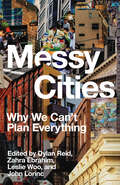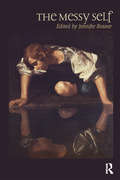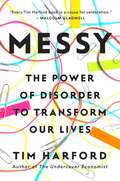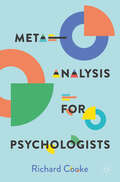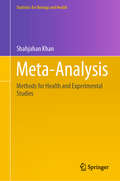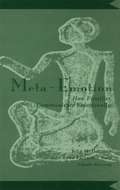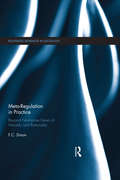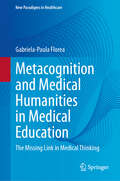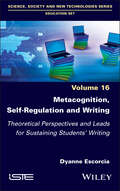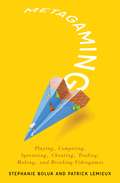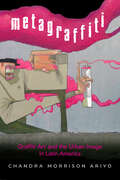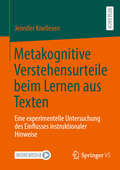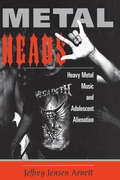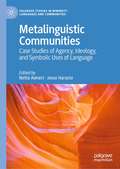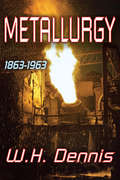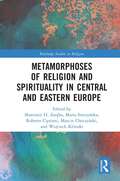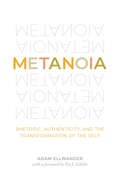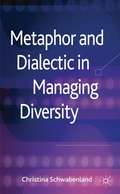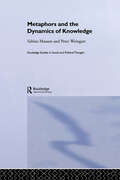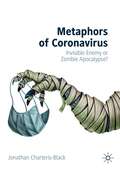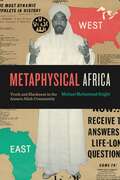- Table View
- List View
Messy Cities: Why We Can't Plan Everything
by John Lorinc Zahra Ebrahim Dylan Reid Leslie WooCan messiness make our cities more liveable, lively, and inclusive?Crowded streets, sidewalk vendors, jumbled architecture, constant clamour, graffitied walls, parks gone wild: are these signs of a poorly managed city or indicators of urban vitality?Messy Cities: Why We Can’t Plan Everything argues that spontaneity and urban workarounds are not liabilities but essential elements in all thriving cities.Forty-three essays by a range of writers from around the world illuminate the role of messy urbanism in enabling creativity, enterprise, and grassroots initiatives to flourish within dense modern cities.With pieces on guerrilla beaches, desire lines, urban interruptions, and the inner lives of unlovely buildings written by experts from all walks of life, Messy Cities makes the case for embracing disorder while not shying away from confronting its challenges.
Messy Self
by Jennifer RosnerThe Messy Self challenges the idea -- and the ideal -- of a coherent, harmonious self. Taken together, the essays illustrate how a flourishing self is inevitably divided, ambivalent, fractured, messy -- and how the self triumphs through disorder. Written in accessible language by award-winning writers and scholars, the book offers a diversity of perspectives on the complexities of the self. With chapters on creativity, love, self-understanding, self-deception, identity, responsibility, and well-being, The Messy Self gives a range of voices to the ordinary and extraordinary divisions, fragmentations, and uncertainties that mark our everyday experience.
Messy: The Power of Disorder to Transform Our Lives
by Tim Harford"Utterly fascinating. Tim Harford shows that if you want to be creative and resilient, you need a little more disorder in your world." --Adam Grant, New York Times-bestselling author of Originals and Give and TakeFrom the award-winning columnist and author of the national bestseller The Undercover Economist comes a provocative big idea book about the genuine benefits of being messy: at home, at work, in the classroom, and beyond.Messy: The Power of Disorder to Transform Our Lives celebrates the benefits that messiness has in our lives: why it's important, why we resist it, and why we should embrace it instead. Using research from neuroscience, psychology, social science, as well as captivating examples of real people doing extraordinary things, Tim Harford explains that the human qualities we value - creativity, responsiveness, resilience - are integral to the disorder, confusion, and disarray that produce them. From the music studio of Brian Eno to the Lincoln Memorial with Martin Luther King, Jr., from the board room to the classroom, messiness lies at the core of how we innovate, how we achieve, how we reach each other - in short, how we succeed. In Messy, you'll learn about the unexpected connections between creativity and mess; understand why unexpected changes of plans, unfamiliar people, and unforeseen events can help generate new ideas and opportunities as they make you anxious and angry; and come to appreciate that the human inclination for tidiness - in our personal and professional lives, online, even in children's play - can mask deep and debilitating fragility that keep us from innovation. Stimulating and readable as it points exciting ways forward, Messy is an insightful exploration of the real advantages of mess in our lives.From the Hardcover edition.
Messy: The Power of Disorder to Transform Our Lives
by Tim Harford“Utterly fascinating. Tim Harford shows that if you want to be creative and resilient, you need a little more disorder in your world.” —Adam Grant, New York Times-bestselling author of Originals and Give and Take“Engrossing.” —New York TimesFrom the award-winning columnist and author of the national bestseller The Undercover Economist comes a provocative big idea book about the genuine benefits of being messy: at home, at work, in the classroom, and beyond.Look out for Tim's next book, Fifty Inventions That Shaped the Modern Economy.Messy: The Power of Disorder to Transform Our Lives celebrates the benefits that messiness has in our lives: why it’s important, why we resist it, and why we should embrace it instead. Using research from neuroscience, psychology, social science, as well as captivating examples of real people doing extraordinary things, Tim Harford explains that the human qualities we value – creativity, responsiveness, resilience – are integral to the disorder, confusion, and disarray that produce them. From the music studio of Brian Eno to the Lincoln Memorial with Martin Luther King, Jr., from the board room to the classroom, messiness lies at the core of how we innovate, how we achieve, how we reach each other – in short, how we succeed. In Messy, you’ll learn about the unexpected connections between creativity and mess; understand why unexpected changes of plans, unfamiliar people, and unforeseen events can help generate new ideas and opportunities as they make you anxious and angry; and come to appreciate that the human inclination for tidiness – in our personal and professional lives, online, even in children’s play – can mask deep and debilitating fragility that keep us from innovation. Stimulating and readable as it points exciting ways forward, Messy is an insightful exploration of the real advantages of mess in our lives.
Meta-Analysis for Psychologists
by Richard CookeThis textbook provides a comprehensive, user-friendly guide to meta-analysis and how to conduct it, using open source software and based on examples commonly found in the field of psychology. Meta-analysis is a key tool used in systematic literature reviews to synthesize research findings across studies, but despite being relatively straightforward to perform, it remains underused by psychologists. In the first section the reader is introduced to key ideas that underlie meta-analysis and how it might be best employed. Following this the reader is guided through how to run a meta-analysis of correlational studies and experimental studies using the free and open statistical software JAMOVI. In the concluding section Professor Cooke considers common issues, key debates and examines the relative merits of different analyses and different software packages.Covers theory, key issues and step-by-step demonstrationsIncludes examples worked examples familiar to psychologists and datasetsCompanion videos demonstrate the methods outlinedIt will provide a valuable new resource for postgraduate students and researchers in the behavioural and social sciences looking to enhance their methodological skills.
Meta-Analysis: Methods for Health and Experimental Studies (Statistics for Biology and Health)
by Shahjahan KhanThis book focuses on performing hands-on meta-analysis using MetaXL, a free add-on to MS Excel. The illustrative examples are taken mainly from medical and health sciences studies, but the generic methods can be used to perform meta-analysis on data from any other discipline. The book adopts a step-by-step approach to perform meta-analyses and interpret the results. Stata codes for meta-analyses are also provided. All popularly used meta-analytic methods and models – such as the fixed effect model, random effects model, inverse variance heterogeneity model, and quality effect model – are used to find the confidence interval for the effect size measure of independent primary studies and the pooled study. In addition to the commonly used meta-analytic methods for various effect size measures, the book includes special topics such as meta-regression, dose-response meta-analysis, and publication bias. The main attraction for readers is the book’s simplicity and straightforwardness in conducting actual meta-analysis using MetaXL. Researchers would easily find everything on meta-analysis of any particular effect size in one specific chapter once they could determine the underlying effect measure. Readers will be able to see the results under different models and also will be able to select the correct model to obtain accurate results.
Meta-Emotion: How Families Communicate Emotionally
by John Mordechai Gottman Lynn Fainsilber Katz Carole HoovenThis book describes research on the emotional communication between parents and children and its effect on the children's emotional development. Inspired by the work, and dedicated to the memory of Dr. Haim Ginott, it presents the results of initial exploratory work with meta-emotion--feelings about feelings. The initial study of meta-emotion generated some theory and made it possible to propose a research agenda. Clearly replication is necessary, and experiments are needed to test the path analytic models which have been developed from the authors' correlational data. The authors hope that other researchers will find these ideas interesting and stimulating, and will inspire investigation in this exciting new area of a family's emotional life.
Meta-Regulation in Practice: Beyond Normative Views of Morality and Rationality (Routledge Advances in Sociology)
by F.C. SimonMeta-regulation presents itself as a progressive policy approach that can manage complexity and conflicting objectives better than traditional command and control regulation. It does this by ‘harnessing’ markets and enlisting a broad range of stakeholders to reach a more inclusive view of the public interest that a self-regulating business can then respond to. Based on a seventeen year study of the Australian energy industry, and via the lens of Niklas Luhmann’s systems theory, Meta-Regulation in Practice argues that normative meta-regulatory theory relies on questionable assumptions of stakeholder morality and rationality. Meta-regulation in practice appears to be most challenged in a complex and contested environment; the very environment it is supposed to serve best. Contending that scholarship must prioritise an understanding of communicative possibilities in practice, this book will be of interest to undergraduate and postgraduate students, as well as postdoctoral researchers interested in subjects such as business regulation, systems theory and corporate social responsibility. Please visit meta-regulation.com for more insightful information on meta-regulation and Meta-Regulation in Practice.
Metacognition and Medical Humanities in Medical Education : The Missing Link in Medical Thinking (New Paradigms in Healthcare)
by Gabriela-Paula FloreaThis book offers a pioneering interdisciplinary exploration into the role of metacognition in medical education and practice, focusing on transforming the doctor-patient relationship through cognitive, metacognitive, and humanistic approaches. It provides critical insights into how metacognitive strategies can enhance communication, empathy, and decision-making in clinical settings, thereby improving patient outcomes, healthcare quality, and burnout syndrome prevention among healthcare practitioners. The main topics covered in the book include the analysis of traditional and contemporary models of medical practice, the cognitive dynamics between healthcare providers and patients, and the integration of metacognitive training in medical education and practice. The volume delves into the philosophical underpinnings of medical practice, comparing biomedical and biopsychosocial models while promoting a more nuanced, relationship-centered approach that considers individual belief systems and psychological needs. This book advocates for a shift in mentalities rather than a paradigm shift. These topics are not just important; they are crucial as they address the ongoing quality-of-care crisis in healthcare systems worldwide. By focusing on metacognition, the book highlights the importance of self-awareness, reflection, and critical thinking in medical practice. It challenges conventional paternalistic models by promoting a collaborative, humanistic approach that values the doctor-patient relationship as a dynamic, interdependent process.
Metacognition, Self-Regulation and Writing: Theoretical Perspectives and Leads for Sustaining Students' Writing
by Dyanne EscorciaStudents' difficulties in producing texts that meet the requirements of academic writing are a recurring concern for teaching staff and those responsible for university courses. Various initiatives are currently being taken, mainly at undergraduate level, to help students improve the quality of their writing. Research into metacognitive processes and the self-regulation of learning can be used to support the design of these writing support systems, particularly by providing a better understanding of the students' difficulties. This book reviews the concepts of metacognition and self-regulation in relation to writing processes. It analyses the metacognitive components involved in text production, their links with successful writing and their individual and contextual determinants. It completes this analysis by drawing on the teaching and assessment of writing in higher education. All of these elements are articulated around a multifactorial modeling of the learning and teaching of academic writing.
Metagaming: Playing, Competing, Spectating, Cheating, Trading, Making, and Breaking Videogames (Electronic Mediations #53)
by Stephanie Boluk Patrick LeMieuxThe greatest trick the videogame industry ever pulled was convincing the world that videogames were games rather than a medium for making metagames. Elegantly defined as &“games about games,&” metagames implicate a diverse range of practices that stray outside the boundaries and bend the rules: from technical glitches and forbidden strategies to Renaissance painting, algorithmic trading, professional sports, and the War on Terror. In Metagaming, Stephanie Boluk and Patrick LeMieux demonstrate how games always extend beyond the screen, and how modders, mappers, streamers, spectators, analysts, and artists are changing the way we play.Metagaming uncovers these alternative histories of play by exploring the strange experiences and unexpected effects that emerge in, on, around, and through videogames. Players puzzle through the problems of perspectival rendering in Portal, perform clandestine acts of electronic espionage in EVE Online, compete and commentate in Korean StarCraft, and speedrun The Legend of Zelda in record times (with or without the use of vision). Companies like Valve attempt to capture the metagame through international e-sports and online marketplaces while the corporate history of Super Mario Bros. is undermined by the endless levels of Infinite Mario, the frustrating pranks of Asshole Mario, and even Super Mario Clouds, a ROM hack exhibited at the Whitney Museum of American Art.One of the only books to include original software alongside each chapter, Metagaming transforms videogames from packaged products into instruments, equipment, tools, and toys for intervening in the sensory and political economies of everyday life. And although videogames conflate the creativity, criticality, and craft of play with the act of consumption, we don&’t simply play videogames—we make metagames.
Metagraffiti: Graffiti Art and the Urban Image in Latin America
by Chandra Morrison AriyoFocusing on graffiti scenes from São Paulo and Santiago in Chile, this innovative visual ethnography examines diverse forms of self-reference and metareference that appear in Latin American graffiti art. Chandra Morrison Ariyo works across multiple scales of contemporary graffiti production—from tags to massive murals—to show how painting the city enables individuals to reimagine their own position within the material and social structures around them. Metagraffitti reveals how practitioners such as Tinho, OSGEMEOS, Grin, and Bisy use metagraffiti features to influence public perceptions about this art form and its effect on the urban environment. Ultimately, Metagraffiti proposes a novel conceptual framework that highlights graffiti’s ability to forge alternative forms of movement, sociality, and value within Latin American cityscapes. These urban images invite us to imagine what the city could be, when seen as a site for action and imagination.
Metakognitive Verstehensurteile beim Lernen aus Texten: Eine experimentelle Untersuchung des Einflusses instruktionaler Hinweise
by Jennifer KnellesenJennifer Knellesen untersucht in diesem Buch, ob instruktionale Hinweise über die Testanforderungen die Urteilsgenauigkeit von Lehramtsstudierenden beim Lernen aus Texten verbessern können. Ausgangspunkt ist, dass Studierende oft dazu neigen, ihr Verständnis zu überschätzen, was auf die Diskrepanz zwischen genutzten Hinweisen (Cues) und den kognitiven Anforderungen der Testfragen zurückgeführt werden kann. Instruktionale Hinweise sollen helfen, diagnostischere Cues zu nutzen und somit die Genauigkeit des Verstehensurteils zu erhöhen. In zwei randomisierten Experimenten mit Lehramtsstudierenden wurde der Einfluss verschiedener Leseinstruktionen auf die Urteilsverzerrung untersucht. Die Ergebnisse zeigen, dass Anwendungsinstruktionen zwar zu einem elaborierteren Leseprozess führten, jedoch ohne weitere Unterstützung nicht ausreichten, um die Überschätzung des Verständnisses signifikant zu reduzieren. Zudem weisen die Studien darauf hin, dass die Eigenschaften der Texte die Wirkung von instruktionalen Hinweisen beeinflussen können. Die Arbeit liefert damit wichtige Erkenntnisse für die Gestaltung effektiver Lernmaterialien im Hochschulkontext.
Metalheads: Heavy Metal Music and Adolescent Alienation
by Jeffrey Arnett<p>Heavy metal is a violent, head-bashing music complete, in its live performances, with its own arena of rage and celebration, the mosh pit. It is a music in the red corner of society, loud, angry, and, to a well-tuned ear, practically intolerable. And yet, the art form radiates a message about American adolescents well worth examining and comprehending: Its devotees, primarily adolescent boys, are alienated from their world and angry about its future. <p>Heavy metal speaks throbbingly the message of rage, loneliness, and cynicism.In this sensitive book, Jeffrey Jensen Arnett synthesizes the stories and experiences of seventy male and thirty-eight female “metalheads” in a successful attempt to understand the often crippling results of a society and an image of the nuclear family steeped in conformity, self-denial, and obedience. The vacuum such an atmosphere creates in the individual can be temporarily obliterated by a heavy metal concert, which Arnett sees as a substitute manhood ritual. This conclusion is just one of the many striking hypotheses the author advances in this dynamic study of a music and its followers. <p>Of the one hundred metalheads interviewed for this volume, ten have allowed themselves to be profiled in depth—the reader becomes fully acquainted with Jack, for instance, and with the multiple crosses decorating his body, his black rose tattoo, and his tumultuous family life; or with slim and well-groomed Jean dressed entirely in black, her favorite color, and wearing the temperament of withdrawal. This is a unique study filled with compassion for a disenfranchised subculture and the respect to want to understand it.</p>
Metalinguistic Communities: Case Studies of Agency, Ideology, and Symbolic Uses of Language (Palgrave Studies in Minority Languages and Communities)
by Netta Avineri Jesse HarastaThis edited volume brings together ten compelling ethnographic case studies from a range of global settings to explore how people build metalinguistic communities defined not by use of a language, but primarily by language ideologies and symbolic practices about the language. The authors examine themes of agency, belonging, negotiating hegemony, and combating cultural erasure and genocide in cultivating meaningful metalinguistic communities. Case studies include Spanish and Hebrew in the USA, Kurdish in Japan, Pataxó Hãhãhãe in Brazil, and Gallo in France. The afterword, by Wesley L. Leonard, provides theoretical and on-the-ground context as well as a forward-looking focus on metalinguistic futurities. This book will be of interest to interdisciplinary students and scholars in applied linguistics, linguistic anthropology and migration studies.
Metallurgy: 1863-1963
by W.H. DennisThe world's output of metals during the 100 year period of 1863-1963 was greater than in all the previous years of man's history. In the nineteenth century the only metals available to industry were cast and wrought iron and a few non-ferrous metals and their alloys; by the latter part of the twentieth century, steel and aluminum dominated the world, and metals that were mere laboratory curiosities provided the basis for the technology of nuclear energy and space travel. This book records the extraordinary history of metallurgical progress, in which metal art was replaced by metal science. It remains a classic work on the subject. The book begins with an introductory chapter that surveys the entire field to be covered, and follows with eight chapters each dealing with progress in one of the major branches of the metallurgical industry: ore dressing, pyrometallurgy, iron and steel, the major non-ferrous metals, new metals (such as uranium, germanium and cobalt), precious metals, the shaping of metals, and metallography. The book reviews developments in all countries, but American practice - which led the world - is given special prominence. A glossary of metallurgical terms and full name and subject indexes are included. The book is a basic reference work as well as an absorbing history of an important aspect of man's technological progress.
Metamorphoses of Religion and Spirituality in Central and Eastern Europe (Routledge Studies in Religion)
by Sławomir H. ZarębaThis book offers a range of contemporary sociological reflections on new manifestations of religion, religiosity, and spirituality in Central and Eastern Europe, a region that has seen significant social and political transformation. It explores the development of cultural and religious trends, including secularisation, new spiritualit,y and a resurgence of religiosity outside of traditional structures. The theoretical and empirical contributions by established and emerging scholars address topics including: the experiences and values of young people, the role and influence of media, the relationship between public and private religion, and the position of state and institutions. The book will be of particular interest to sociologists of religion and others focused on contemporary Central and Eastern European societies.
Metamorphoses of the City
by Pierre ManentWhat is the best way to govern ourselves? The history of the West has been shaped by the struggle to answer this question, according to Pierre Manent. A major achievement by one of Europes most influential political philosophers, "Metamorphoses of the City" is a sweeping interpretation of Europes ambition since ancient times to generate ever better forms of collective self-government, and a reflection on what it means to be modern. Manents genealogy of the nation-state begins with the Greek city-state, the "polis. " With its creation, humans ceased to organize themselves solely by family and kinship systems and instead began to live politically. Eventually, as the "polis" exhausted its possibilities in warfare and civil strife, cities evolved into empires, epitomized by Rome, and empires in turn gave way to the universal Catholic Church and finally the nation-state. Through readings of Aristotle, Augustine, Montaigne, and others, Manent charts an intellectual history of these political forms, allowing us to see that the dynamic of competition among them is a central force in the evolution of Western civilization. Scarred by the legacy of world wars, submerged in an increasingly technical transnational bureaucracy, indecisive in the face of proliferating crises of representative democracy, the European nation-state, Manent says, is nearing the end of its line. What new metamorphosis of the city will supplant it remains to be seen.
Metanoia: Rhetoric, Authenticity, and the Transformation of the Self
by Adam EllwangerWestern culture is in a moment when wholly new kinds of personal transformations are possible, but authentic transformation requires both personal testimony and public recognition. In this book, Adam Ellwanger takes a distinctly rhetorical approach to analyzing how the personal and the public relate to an individual’s transformation and develops a new vocabulary that enables a critical assessment of the concept of authenticity. The concept of metanoia is central to this project. Charting the history of metanoia from its original use in the classical tradition to its adoption by early Christians as a term for religious conversion, Ellwanger shows that metanoia involves a change within a person that results in a truer version of him- or herself—a change in character or ethos. He then applies this theory to our contemporary moment, finding that metanoia provides unique insight into modern forms of self-transformation. Drawing on ancient and medieval sources, including Thucydides, Plato, Paul the Apostle, and Augustine, as well as contemporary discourses of self-transformation, such as the public testimonies of Caitlyn Jenner and Rachel Dolezal, Ellwanger elucidates the role of language in signifying and authenticating identity. Timely and original, Ellwanger’s study formulates a transhistorical theory of personal transformation that will be of interest to scholars working in social theory, philosophy, rhetoric, and the history of Christianity.
Metanoia: Rhetoric, Authenticity, and the Transformation of the Self (G - Reference, Information And Interdisciplinary Subjects Ser.)
by Adam EllwangerWestern culture is in a moment when wholly new kinds of personal transformations are possible, but authentic transformation requires both personal testimony and public recognition. In this book, Adam Ellwanger takes a distinctly rhetorical approach to analyzing how the personal and the public relate to an individual’s transformation and develops a new vocabulary that enables a critical assessment of the concept of authenticity. The concept of metanoia is central to this project. Charting the history of metanoia from its original use in the classical tradition to its adoption by early Christians as a term for religious conversion, Ellwanger shows that metanoia involves a change within a person that results in a truer version of him- or herself—a change in character or ethos. He then applies this theory to our contemporary moment, finding that metanoia provides unique insight into modern forms of self-transformation. Drawing on ancient and medieval sources, including Thucydides, Plato, Paul the Apostle, and Augustine, as well as contemporary discourses of self-transformation, such as the public testimonies of Caitlyn Jenner and Rachel Dolezal, Ellwanger elucidates the role of language in signifying and authenticating identity. Timely and original, Ellwanger’s study formulates a transhistorical theory of personal transformation that will be of interest to scholars working in social theory, philosophy, rhetoric, and the history of Christianity.
Metaphor and Dialectic in Managing Diversity
by Christina SchwabenlandMetaphor and dialectic are modes of thinking that influence the ways in which we identify what we have in common with others, how we differ and how we manage this diversity to achieve organizational goals. This book explores how we can become more aware of these unconscious processes and challenge stereotypes.
Metaphor and the Dynamics of Knowledge (Routledge Studies in Social and Political Thought)
by Peter Weingart Sabine MaasenThis book opens up a new route to the study of knowledge dynamics and the sociology of knowledge. The focus is on the role of metaphors as powerful catalysts, and the book dissects their role in the construction of theories of knowledge. It is of vital interest to social and cognitive scientists alike.
Metaphor and the Historical Evolution of Conceptual Mapping
by Richard TrimAn investigation of the historical evolution of figurative language within the framework of cognitive linguistics. It examines how and why metaphors evolve through the ages; discusses the role of culture; patterns of metaphor evolution; how many people use particular expressions.
Metaphors of Coronavirus: Invisible Enemy or Zombie Apocalypse?
by Jonathan Charteris-BlackThis book explores the metaphors used in public and media communication to ask how language shapes our moral reasoning about the global coronavirus crisis. The author offers insights into the metaphors, metonyms, allegories and symbols of the global crisis and examines how they have contributed to policy formation and communication. Combining metaphor theory with moral foundations theory, he places metaphors in their historical contexts, and then critically questions why certain tropes might be used in particular situations to persuade and convince an audience. The book takes an integrated approach, involving ideas from cognitive linguistics, history, social psychology and literature to produce a multi-layered and thematically rich interpretation of the language of the pandemic and its social and political consequences. It will be relevant to readers with a background in these areas, as well as anyone with a general interest in the language used to make sense of this global event.
Metaphysical Africa: Truth and Blackness in the Ansaru Allah Community (Africana Religions #4)
by Michael Muhammad KnightThe Ansaru Allah Community, also known as the Nubian Islamic Hebrews (AAC/NIH) and later the Nuwaubians, is a deeply significant and controversial African American Muslim movement. Founded in Brooklyn in the 1960s, it spread through the prolific production and dissemination of literature and lecture tapes and became famous for continuously reinventing its belief system. In this book, Michael Muhammad Knight studies the development of AAC/NIH discourse over a period of thirty years, tracing a surprising consistency behind a facade of serial reinvention.It is popularly believed that the AAC/NIH community abandoned Islam for Black Israelite religion, UFO religion, and Egyptosophy. However, Knight sees coherence in AAC/NIH media, explaining how, in reality, the community taught that the Prophet Muhammad was a Hebrew who adhered to Israelite law; Muhammad’s heavenly ascension took place on a spaceship; and Abraham enlisted the help of a pharaonic regime to genetically engineer pigs as food for white people. Against narratives that treat the AAC/NIH community as a postmodernist deconstruction of religious categories, Knight demonstrates that AAC/NIH discourse is most productively framed within a broader African American metaphysical history in which boundaries between traditions remain quite permeable.Unexpected and engrossing, Metaphysical Africa brings to light points of intersection between communities and traditions often regarded as separate and distinct. In doing so, it helps move the field of religious studies beyond conventional categories of "orthodoxy" and "heterodoxy," challenging assumptions that inform not only the study of this particular religious community but also the field at large.
